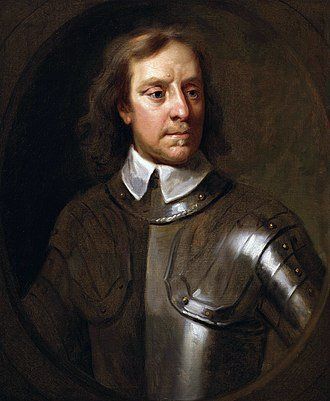The Christian race is set before all believers in Jesus Christ, and a great cloud of witnesses surrounds them (Hebrews 12:1-2). One comparatively recent witness, born 400 years ago this month, was Oliver Cromwell (1599-1658), who rose from obscurity to become Lord Protector of the Commonwealth of England, Scotland and Ireland.
Maligned
Cromwell has always been maligned and misrepresented. In March 1648 he wrote to a certain Colonel Norton: ‘I know God has been above all ill-reports, and will in his own time vindicate me’. God’s time for this was the year 1845 when Thomas Carlyle, an eminent Victorian literary figure, published Oliver Cromwell’s Letters and Speeches. He came to the revolutionary conclusion that Cromwell was ‘not a man of falsehoods but a man of truths’. People could now come face to face with the real Cromwell rather than the distorted monster of tradition.
Cromwell’s letters reveal him as a man of burning Christian conviction, spiritual integrity and sincere piety. He not only made a good start in the race, but also ran consistently and finished gloriously. From his many writings it is possible to trace the course of the race that was set before him, from its good beginning to its triumphant conclusion.

To honour God
Cromwell began the race from the starting-blocks of conviction. Writing to his cousin in October 1638, he expresses the desire ‘to honour my God by declaring what he hath done for my soul’. He boldly affirms, ‘My soul is with the congregation of the firstborn, my body rests in hope; and if here I may honour my God either by doing or by suffering, I shall be most glad’.
He continues, ‘He giveth me to see light in his light. One beam in a dark place hath exceeding much refreshment in it – blessed be his name for shining upon so dark a heart as mine! … pray for me, that he who hath begun a good work would perfect it in the day of Christ’.
Marston Moor
Cromwell’s life spanned a turbulent period of English history, a time when many Puritans risked their lives by emigrating to the New World rather than conform to the Established Church. Anglican intolerance and persecution were at their height. The Crown sought to rule without Parliament, and in 1642 England was plunged into civil war. Cromwell, by now MP for Huntingdon, threw in his lot with Parliament, and by sheer ability and military genius rose to be the foremost figure of his age.
On 2 July 1644 Parliament’s army won the resounding victory of Marston Moor, thanks to Cromwell’s steady nerve and brilliant tactics. Three days later we find him writing to his brother-in-law, Colonel Walton. ‘Truly England and the Church of God hath had a great favour from the Lord, in this great victory given unto us, such as the like never was since this war began … give glory, all the glory to God’.
Support in grief
Cromwell then breaks off from recounting the battle and administers spiritual comfort. ‘Sir, God hath taken away your eldest son by a cannon-shot. It brake his leg. We were necessitated to have it cut off, whereof he died. Sir, you know my own trials this way’ (Oliver’s own son had recently been killed near Knaresborough), ‘but the Lord supported me with this, that the Lord took him into the happiness we all pant for and live for.
‘There is your precious child full of glory, never to know sin or sorrow any more. He was a gallant young man, exceedingly gracious. God give you his comfort … Truly he was exceedingly beloved in the army, of all that knew him. But few knew him; for he was a precious young man, fit for God. You have cause to bless the Lord. He is a glorious saint in heaven; wherein you ought exceedingly to rejoice. Let this drink up your sorrow … You may do all things by the strength of Christ. Seek that, and you shall easily bear your trial … The Lord be your strength: So prays your truly faithful and loving brother, Oliver Cromwell.’

Writing to his daughter
Despite the ever-increasing pressure of public affairs Cromwell, as an affectionate father, made time on 25 October 1646 to write to his daughter Bridget:
‘I write not to thy husband; partly to avoid trouble, for one line of mine begets many of his, which I doubt makes him sit up too late; partly because I am myself indisposed at this time, having some other considerations.
‘Your friends at Ely are well: your sister Claypole is, I trust in mercy, exercised with some perplexed thoughts. She sees her own vanity and carnal mind; bewailing it: she seeks after (as I hope also) what will satisfy … Dear heart, press on; let not husband, let not anything cool thy affections after Christ. I hope he will be an occasion to inflame them. That which is best worthy of love in thy husband is that of the image of Christ he bears. Look on that, and love it best, and all the rest for that’.
Writing to his son
Some years later (April 1650) he wrote to his son Richard: ‘Seek the Lord and his face continually – let this be the business of your life and strength, and let all things be subservient and in order to this! You cannot find nor behold the face of God but in Christ; therefore labour to know God in Christ; which the Scripture makes to be the sum of all, even Life Eternal’.
Cromwell followed up this exhortation with a letter in July to Richard’s father-in-law: ‘I hope you give my son good counsel; I believe he needs it. He is in the dangerous time of his age; and it’s a very vain world. O how good it is to close with Christ betimes! – There is nothing else worth the looking after’.
Propagating the gospel
Throughout his life Cromwell was upheld by his robust Calvinistic theology. His was no mere intellectual assent but rather ardent conviction. He desired above all things the prosperity of the gospel. He actively encouraged the measures taken by Parliament to propagate the gospel in New England, and we find him in October 1651 corresponding with John Cotton, pastor of the church at Boston in Massachusetts.
‘Worthy Sir, and my Christian friend,’ he writes, ‘Surely, Sir, the Lord is greatly to be feared and to be praised! … Who is a God like ours? To know his will, to do his will are both of him … Truly I am ready to serve you and the rest of our brethren and the churches with you. I am a poor weak creature, and not worthy the name of a worm; yet accepted to serve the Lord and his people’.

Care for the flock
Cromwell’s passionate concern was for the welfare of all the people of God. Addressing his first Parliament in July 1653 he said: ‘I beseech you – but I think I need not – have a care of the whole flock! Love the sheep, love the lambs: love all, tender all, cherish and countenance all, in all things that are good. And if the poorest Christian, the most mistaken Christian, shall desire to live peaceably and quietly under you – I say, if any shall desire but to lead a life of godliness and honesty, let him be protected’.
Cromwell’s benevolence extended far beyond our own shores and the infant settlements of the New World. In 1655 a fearful massacre had befallen the Protestant Piedmontese, perpetrated by the troops of the Duke of Savoy, a vassal of Catholic France. Cromwell donated £2,000 to the national subscription raised for the relief of the sufferers, and put such diplomatic pressure on France that the violence ceased.
The last days
Cromwell not only began the Christian race well, but ran consistently throughout his earthly course. And, what is of supreme importance, he finished his race triumphantly. We have detailed accounts of the last days of the Protector, related by those who attended him.
When his children and wife stood weeping round him he said: ‘Love not this world. I say unto you, it is not good that you should love this world … Children, live like Christians – I leave you the covenant to feed upon!’
As his life slowly ebbed away, he was heard to say: ‘The Lord hath filled me with as much assurance of his pardon, and his love, as my soul can hold – I think I am the poorest wretch that lives: but I love God; or rather, am beloved of God – I am a conqueror, and more than a conqueror, through Christ that strengtheneth me!’
Two or three days before he died Oliver uttered this last prayer: ‘Lord, though I am a miserable and wretched creature, I am in covenant with thee through grace. And I may, I will, come to thee, for thy people. Thou hast made me, though very unworthy, a mean instrument to do them some good, and thee service …
‘Lord, however thou do dispose of me, continue and go on to do good for them. Give them consistency of judgement, one heart, and mutual love; and go on to deliver them, and with the work of reformation; and make the name of Christ glorious in the world’.
On 3 September 1658 the soul of Oliver Cromwell soared heavenwards and joined ‘the spirits of just men made perfect’, awaiting the glorious resurrection.



